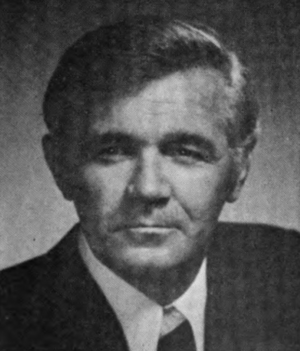Richard Fulton facts for kids
Quick facts for kids
Richard Fulton
|
|
|---|---|
 |
|
| 2nd Mayor of Metropolitan Nashville | |
| In office 1975–1987 |
|
| Preceded by | Beverly Briley |
| Succeeded by | Bill Boner |
| 41st President of the United States Conference of Mayors | |
| In office 1983–1984 |
|
| Preceded by | Coleman Young |
| Succeeded by | Hernán Padilla |
| Member of the U.S. House of Representatives from Tennessee's 5th district |
|
| In office January 3, 1963 – August 14, 1975 |
|
| Preceded by | J. Carlton Loser |
| Succeeded by | Clifford Allen |
| Member of the Tennessee State Senate | |
| In office 1955–1963 |
|
| Personal details | |
| Born |
Richard Harmon Fulton
January 27, 1927 Nashville, Tennessee, U.S. |
| Died | November 28, 2018 (aged 91) Nashville, Tennessee, U.S. |
| Political party | Democratic |
| Alma mater | University of Tennessee |
Richard Harmon Fulton (born January 27, 1927, died November 28, 2018) was an important American politician. He was a member of the Democratic Party. He served in the Tennessee State Senate and the United States House of Representatives. He also became the second mayor of Nashville and Davidson County.
Contents
About Richard Fulton
Richard Fulton was born in Nashville, Tennessee. He went to East Nashville High School. During World War II, he served in the United States Navy.
After the war, he studied at the University of Tennessee. He even played football for the Volunteers team. Richard Fulton passed away on November 28, 2018, in Nashville. He was 91 years old.
Richard Fulton's Political Career
Richard Fulton had a long career in politics. He served at both the state and national levels. He also led his hometown as mayor.
Serving in the State Senate
In 1954, Richard Fulton was chosen to join the Tennessee State Senate. He took the place of his brother, Lyle, who had sadly passed away.
When Fulton was sworn in, he was only 29 years old. However, the Tennessee State Constitution said senators had to be at least 30. So, the Senate voted to remove him. He could not serve until he was elected again in 1956, when he was 31. He was reelected in 1958. After that, he left politics for a while to work in real estate.
Working in Congress
In 1962, Fulton decided to run for the United States House of Representatives. He ran in the 5th Congressional District of Tennessee. He won the election and served in Congress.
While in Congress, Richard Fulton voted for important laws. These included the Civil Rights Act of 1964 and the Civil Rights Act of 1968. He also supported the Voting Rights Act of 1965. These laws helped protect the rights of all Americans. He left Congress when he was elected mayor of Nashville.
Becoming Mayor of Nashville
Richard Fulton served as mayor of Nashville, Tennessee, for three terms. He was mayor from 1975 to 1987. During his time as mayor, he helped Nashville grow and improve.
He played a big part in developing downtown Nashville. He helped create Riverfront Park and the Nashville Convention Center. He also supported building Interstate 440. Mayor Fulton also helped add 485 acres of new parks to the city.
From 1983 to 1984, Richard Fulton was the president of the United States Conference of Mayors. This group helps mayors across the country work together.
 | Isaac Myers |
 | D. Hamilton Jackson |
 | A. Philip Randolph |

